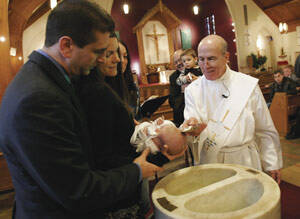As the U.S. Catholic bishops consider a common agreement on baptism with four Protestant church communities, they “stand at an important juncture” in the quest for Christian unity, according to the chairman of the bishops’ Committee on Ecumenical and Interreligious Affairs. Archbishop Wilton D. Gregory of Atlanta said the “Common Agreement on Mutual Recognition of Baptism,” to be voted on at the bishops’ fall general assembly from Nov. 15 to 18 in Baltimore, Md., would affirm “the unity that Christ has given to the baptized members of his body, a unity that is ever fragile and always in need of support from the pastors of the church.”
While other bishops’ conferences around the world have entered into similar agreements with Protestant communities in their regions, the proposed document is unprecedented for the U.S. Catholic Church. The agreement has already been ratified by the Presbyterian Church. If the U.S.C.C.B. approves it, any baptisms performed in either Catholic or Presbyterian churches after that would be mutually recognized, as long as the proper formula is used and documented. The other three Protestant communities are to consider the agreement at their national meetings in the coming months.
The proposed agreement was drawn up over the past six years by a team of scholars from the Catholic-Reformed dialogue group, made up of representatives of the U.S. Conference of Catholic Bishops, Christian Reformed Church in North America, Presbyterian Church (USA), Reformed Church in America and United Church of Christ.
Calling baptism “the sacramental gateway into the Christian life,” the agreement says baptism “is to be conferred only once, because those who are baptized are decisively incorporated into the body of Christ.”
For baptisms to be mutually recognized by the five churches, the baptismal rite must use water and the Trinitarian formula, “Father, Son and Holy Spirit,” the document says. It also encourages Reformed church communities to use baptismal registers, as Catholic parishes already do, and to document the liturgical formula used in the ceremony. Each church also will issue its own “reception statement,” designed to explain the new agreement to its own members.
The agreement encourages continued dialogue between Catholic and Reformed leaders “about theology and pastoral practice from local to international settings.” The common agreement on baptism was one result of the seventh round of the Catholic-Reformed dialogue that ended with a meeting in Henryville, Ind., in October. The dialogue also produced a report on baptism, titled These Living Waters, and a document on the Eucharist/Lord’s Supper called This Bread of Life.








